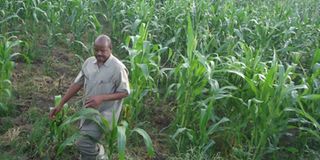Policy makers, research directors agree on initiatives to boost smart agriculture

A farmer in his field of maize. Adopting good practices such as sustainable intensification will enable African countries achieve the potential of their agricultural sectors. File photo
Ministers of agriculture and directors of research from Kenya, Mozambique, Rwanda, Tanzania, and Uganda have pledged to fast-track the implementation of sustainable intensification of agricultural practices.
The ministers pledged to influence their governments to formulate and implement sound policies, which are backed by evidence from agricultural researchers, socio-economists and development workers.
Agreement
Addressing the High Level Policy Forum on Sustainable Intensification of Maize- Legume Cropping Systems for Food Security in Eastern and Southern Africa (SIMLESA), in Entebbe, Uganda, the ministers agreed with researchers that enhancing access to extension services, agricultural inputs and markets, are part of the critical package of policy actions that must be fast-tracked to maximise benefits from agriculture.
The High Level Policy Forum, running from October 27th to 28th was organised by Asareca in conjunction with CIMMYT, the Australian Government, National Agricultural Organisation (Naro) and Ministry of Agriculture, Animal Industry and Fisheries.
The ministers were represented by officials from the ministries and government agencies in the respective countries .
In a joint communiqué, the ministers agreed that governments, researchers, extension agencies and the private sector need to work together to enable agriculture attain its potential. They agreed to the recommendation that frontline extension workers should be increased to at least 33 staff per 10,000 farmers for an effective extension system.
Facilitate
Speaking at Forum, Prof Francis Wachira, the interim executive secretary, Asareca, said that sustainable intensification practices are part of a range of measures to address low productivity while addressing effects of climate change.
On his part, Dr Mekuria Mulugetta, the coordinator for the SIMLESA project, , urged researchers and socio-economists to proactively provide policy makers factual and researched information to facilitate formulation of sound policies.




